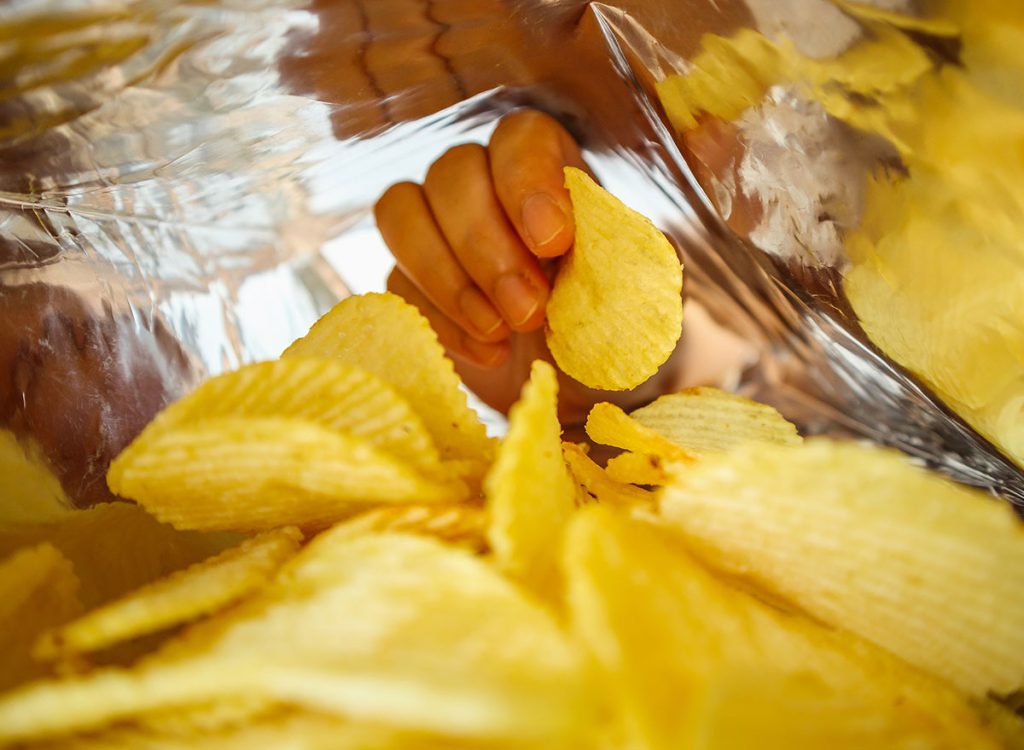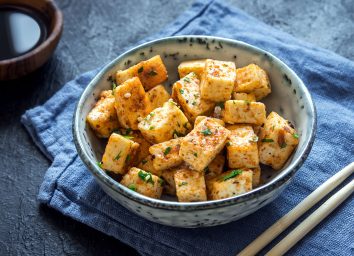The Worst Foods for Joint Pain After 50, Say Dietitians

It's likely not a surprise at this point that your diet can easily affect your body's health. Sure, your weight is affected, but there are many other serious diseases that are linked to poor nutrition—causing your risk of developing those diseases to significantly increase. If you've hit the 50-year milestone and are starting to experience some joint pain, your diet could be a factor in the equation—especially if you're regularly consuming these worst foods.
To preface, joint pain can occur from a myriad of things—like after an intense workout, or even the lack of physical activity in your life. However, joint pain can also happen from inflammation (which can be linked to arthritis) and what you consume can worsen the symptoms you may be experiencing.
While there are a few foods to consider, Sydney Greene, MS, RD, and member of our medical expert board, first points out that joint pain could be linked to a food sensitivity, which can easily be tested if need be.
"If you notice joint pain after meals, it is best to work with a practitioner who can use food sensitivity testing to determine what foods may be the cause," says Greene.
However, Greene points out that "doing a classic elimination diet can be time-consuming and frustrating, especially for individuals over 50 who may have long-standing food habits."
So if testing isn't an option and you are generally curious about foods that can affect your joint pain, here are some recommendations from registered dietitians on foods to limit in your diet and healthy swaps to choose instead. Then, if you're looking for even more healthy eating tips, check out our list of The 7 Healthiest Foods to Eat Right Now.
Refined cooking oils & flours

If testing isn't readily available, Greene's first swap to consider is the cooking oil you're using.
"Try swapping refined vegetable oils for olive oil and avocado oil when cooking to bring down your intake of omega-6 fatty acids," says Greene. "Adding in more omega-3 rich fatty fish like salmon and anchovies can bring down inflammation."
Refined oils aren't the only cooking product that could cause inflammation. The types of flour you are using could also be affecting your joint pain.
"In addition, you can also start swapping refined grains like white flour for grains in their whole form such as wild rice, kamut, and spelt which will decrease blood sugar spikes and dips."
Added sugars

"I suggest limiting added sugar intake," says Lisa Young, PhD, RDN, author of Finally Full, Finally Slim, and another member of our medical expert board. "They can worsen symptoms of arthritis according to research, and may also increase your risk for arthritis and they contain zero nutrients."
Young takes note of different foods that have added sugars to limit such as candy, soda, sweetened drinks, and even sauces and dressings like ketchup.
Here's What Eating Added Sugars Does to Your Body.
Salty foods

"It's well-known that for some people, too much salt is bad for blood pressure," says Cheryl Mussatto MS, RD, LD, author of The Nourished Brain. "What many people may not realize is that eating too many foods high in salt can increase inflammation in joints and may also contribute to fluid retention, leading to a decreased range of motion in the joints."
Mussatto points out that salt from the shaker isn't the only problem. Packaged and processed foods such as "chips, pretzels, frozen pizza or TV dinners" can also be affecting your sodium levels. The average person in the United States consumes 3,400 milligrams of sodium daily, which is above 40% of the recommended daily allowances of 2,300, according to Mussatto.
"To preserve joint health, it's best to reduce salt intake to see if joint pain lessens," says Mussatto. "Do this by avoiding prepackaged foods and instead eat more fruits and vegetables which are naturally low in sodium yet high in important vitamins and minerals necessary for healthy joints."
Fatty foods

"If you minimize the use of saturated fat, it can help you to improve your joint health after 50," says Shannon Henry, RD with EZCare Clinic. "Even better, replace the saturated fat in your diet with unsaturated fat, and you can reduce your risk of developing psoriatic arthritis."
Henry points out how various studies show "people who regularly consume unsaturated fats derived from vegetable oils have a lower risk of developing psoriatic arthritis."
Alcohol

While alcohol is something you sip on and not exactly eat, it's still a major culprit when it comes to joint pain after 50.
"Research has recommended limiting alcohol consumption and avoiding smoking to prevent various joint-related diseases especially when you're aging, such as osteoarthritis, rheumatoid arthritis, gout, and bursitis," says Henry. "Alcohol may interact with certain medications, including painkillers."
For even more aging tips, read these next:








